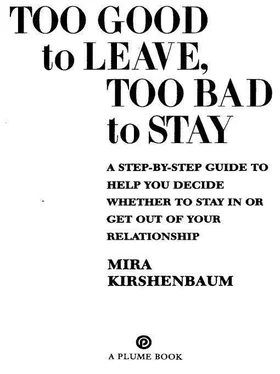Kirshenbaum, Mira - Too Good to Leave, Too Bad to Stay
Здесь есть возможность читать онлайн «Kirshenbaum, Mira - Too Good to Leave, Too Bad to Stay» весь текст электронной книги совершенно бесплатно (целиком полную версию без сокращений). В некоторых случаях можно слушать аудио, скачать через торрент в формате fb2 и присутствует краткое содержание. Жанр: Психология. Описание произведения, (предисловие) а так же отзывы посетителей доступны на портале библиотеки ЛибКат.
- Название:Too Good to Leave, Too Bad to Stay
- Автор:
- Жанр:
- Год:неизвестен
- ISBN:нет данных
- Рейтинг книги:3 / 5. Голосов: 1
-
Избранное:Добавить в избранное
- Отзывы:
-
Ваша оценка:
- 60
- 1
- 2
- 3
- 4
- 5
Too Good to Leave, Too Bad to Stay: краткое содержание, описание и аннотация
Предлагаем к чтению аннотацию, описание, краткое содержание или предисловие (зависит от того, что написал сам автор книги «Too Good to Leave, Too Bad to Stay»). Если вы не нашли необходимую информацию о книге — напишите в комментариях, мы постараемся отыскать её.
Too Good to Leave, Too Bad to Stay — читать онлайн бесплатно полную книгу (весь текст) целиком
Ниже представлен текст книги, разбитый по страницам. Система сохранения места последней прочитанной страницы, позволяет с удобством читать онлайн бесплатно книгу «Too Good to Leave, Too Bad to Stay», без необходимости каждый раз заново искать на чём Вы остановились. Поставьте закладку, и сможете в любой момент перейти на страницу, на которой закончили чтение.
Интервал:
Закладка:
Guideline #8 makes clear that you won’t be happy if you stay in a relationship where you generally end up feeling like a nothing and a nobody, and you will be happy if you leave. The reason I’ve talked about the humiliation trap is to warn you about the forces that might keep you stuck in a situation like this even though it hurts you so much. There’s no way you can win by staying. In that sense it’s not different from physical abuse.
But the sense of release and relief that comes from getting out of a relationship like this is enormous.
7
Talk to Me
Issue: Communication
“We just can’t communicate.”
“We never have anything to talk about.”
“We just don’t understand each other.”
People have long recognized that something about communication is the lifeblood of a relationship. A breakdown in communication is one of those signs, like a child’s fever, that sends people running for help. That much is clear.
But so much else about communication is confusing, particularly when you’re trying to figure out if you’ll be happier leaving or happier staying. For example, when there’s bad communication, is the communication bad because you’re not getting along or are you not getting along because the communication’s bad?
If your partner can’t listen to you, is that because you’re not communicating effectively or because of what you’re talking about or because of your partner’s anger or what?
And when there’s bad communication, what part’s fixable and what part’s fatal? What just looks bad on the outside and what really is bad on the inside?
And there are so many kinds of bad communication. There’s the kind that kills relationships. There’s bad communication that’s a pain in the neck but doesn’t really damage relationships. And there’s bad communication that’s nothing more than the way people interact in normal relationships.
CONFUSED ABOUT COMMUNICATION
No wonder we’re all so confused. To make matters worse, part of us really does want to work at communicating as clearly and effectively as possible, but another part of us feels we’re entitled to relax, be our sloppily communicating selves, and let the chips fall where they may. Isn’t there a part of all of us that’s tired of working on our relationships?
All these communication issues are important because just the way someone with a really bad cold can look sicker and feel sicker than someone who has a fatal cancer, someone in a basically healthy relationship can sometimes be a lot more troubled by their communication than someone in a relationship that’s truly too bad to stay in. In fact, sometimes when things are at their worst you’re so eager to avoid talking about anything difficult that you don’t talk about anything difficult, and that gives you the illusion that things are better than they really are.
So, since you’re trying to figure out what’s best for you to do, we’d better get a handle on exactly what it is about your communication that would point to the need for you to leave your relationship. Everyone has problems with communication in relationships. But you need to know if your problems are the kind that are both unfixable and relationship destroying.
Let’s sort this all out.
THE DIAGNOSTIC NEEDLE IN THE HAYSTACK OF COMMUNICATION
When it comes to communication we’re all stark naked. I might have to guess about or probe for everything else, but in all the years I’ve worked with couples, communication has been the one thing that’s always been right out there in the open. And that’s great. When couples finally get to the point where they can tell the truth and hear the truth and convey their needs and get close without making a mess and without making each other miserable, I know they’re on the road to working things out.
The problem is that there’s so much communicating—good and bad—going on every minute that zeroing in on what’s absolutely critical is very difficult. So let me tell you how I found the diagnostic needle in the haystack of communication.
Soon after I started researching this issue I was confronted by two separate piles of impressive candidates, from which I was sure I’d find those signs of fatally bad communication that point to the exits. I labeled one pile alien communication— problems caused by two people being very different from one another. I labeled the other crazy communication— problems caused by confused, vague, misleading, misconceived words and gestures. These piles contain important communication issues that many of us are overwhelmingly aware of.
But the two piles of candidates proved to be far less helpful than I’d thought in diagnosing relationships. We need to take a moment to talk about them because they figure so prominently in our minds as “relationship destroyers.” Let’s take them one at a time, before we get to the communication issues that really do determine whether it’s best to stay or leave.
Alien Communication
There are more gulfs separating people than you can find in an atlas. But the gulfs that have been getting the most attention recently have been gender gulfs. We’ll focus on these gender gulfs here but the point I’m making about them applies to all of our differences.
There’s a current fad running around this country where we all get excited talking about how utterly, profoundly, interplanetarily different men and women are. One of my daughters called me the other day, excited because she was reading a book all her friends were reading that “explained everything” to her: The book kept revealing the wide chasms between men and women. Certainly every woman who’s ever felt her husband’s basically a Martian—and what woman hasn’t?—has felt validated by these books. He is a Martian! There’s been a lot of emphasis on communication differences like the following:
• A man’s trying to fix a faucet. The woman makes “helpful” suggestions. She’s trying to communicate that she cares, but the message he receives is that he’s not competent to do the job without her help.
• A woman’s trying to fill out a tax form. The man leaves her completely alone. What he’s trying to communicate is his sense that she can do it herself and his support for her doing it herself. But the message she receives is that he just doesn’t care about her.
Because so many of us are such big fans of linking miscommunication with gender these days, you can probably supply endless examples of your own to illustrate this issue.
Now I have no doubt that differences between people, like this gender difference, can make getting along harder. But they don’t kill relationships nor are they signs of dead relationships.
Alien communication is something we can live with. We’ve been living with male/female differences since we evolved from the amoeba stage, and we’ve gotten along so far. An overemphasis on gender differences obscures how skilled we are at bridging these differences. There are plenty of happy heterosexual couples who have few communication problems and yet are just as definitively masculine and feminine as unhappy heterosexual couples with communication problems. And homosexual couples, with no male/female differences to worry about, fall into the miscommunication soup just as easily as everyone else.
I think the real problem in relationships isn’t how untalented we are at bridging our differences; it’s how incredibly talented we are at manufacturing differences out of nothing if necessary, just to create a sense of differentiation, uniqueness, specialness. Besides, communication is the one thing in the universe specifically designed to bridge the gap between our differences. If we’re having trouble with that bridge, partly it’s because we’re so interested in magnifying those differences. But communication is the solution, not the problem.
Читать дальшеИнтервал:
Закладка:
Похожие книги на «Too Good to Leave, Too Bad to Stay»
Представляем Вашему вниманию похожие книги на «Too Good to Leave, Too Bad to Stay» списком для выбора. Мы отобрали схожую по названию и смыслу литературу в надежде предоставить читателям больше вариантов отыскать новые, интересные, ещё непрочитанные произведения.
Обсуждение, отзывы о книге «Too Good to Leave, Too Bad to Stay» и просто собственные мнения читателей. Оставьте ваши комментарии, напишите, что Вы думаете о произведении, его смысле или главных героях. Укажите что конкретно понравилось, а что нет, и почему Вы так считаете.












